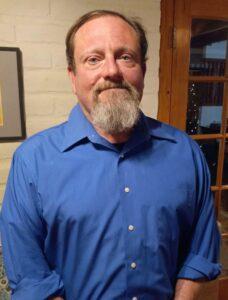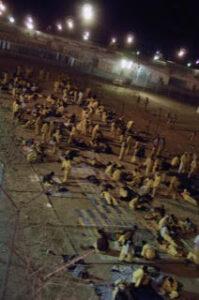Matt Crecelius, USAF (ret.)
by Sue Wolinsky, Family Member, Army IL National Guard
A ‘Non-Conformist’ Serving at Notorious Camp Bucca
He had always wanted a security AFSC (Air Force Specialty Code), ever since he thought about enlisting while he was in high school in central Ohio in 1996. He got that in his 18-1/2 years of service – and much more; not in the branch of military service he had in mind and eventually in a security role in Iraq that changed dramatically after 9/11.
First, a bit about his enlistment. Staff Sergeant (SSgt) Matt Crecelius USAF (Ret.), Veterans and Military Families Caucus (VMFC member in Alamogordo, NM), was short ¼ of a credit needed to graduate high school. Making up that credit meant two weeks of summer school; two weeks too late for the high school Civil Air Patrol member to enter the US Army on delayed enrollment. “The Army recruiter used ‘colorful language’ and treated me like crap when I told him I had to wait. With my limited knowledge of military protocol, I talked back to him and walked out,” Crecelius said.

The USAF: A few months later, he met with a USAF recruiter. The delayed graduation didn’t matter; Matt’s ASVAB scores were off the charts and the recruiter steered him toward mechanic crew chief. But Matt still wanted security. “I went in the next day and said I changed my mind. I half-jokingly said, ‘I only got 99 out of 100.’ Then I threatened to quit if I didn’t get Security Police. He really wanted me to stay in. It took a week or two before he called in a few favors to get my Security AFSC,” Matt said.
“I trained at Lackland AFB and Camp Bullis in Texas. I went from MP to Security Forces. My first assignment lasted 4-1/2 years at Scott AFB in Illinois, which was a dream assignment for me. I was in the 375th Wing of the Air Mobility Command. Here I was, an E3 (because of my Civil Air Patrol work), a 19-year-old kid with a sweetheart in Ohio just a 5-hour drive away, doing security work.”
He quickly was chosen for the Elite Guard, where he stayed for 2-1/2 years. “At first, I only wanted to be a cop in the USAF. I was kinda bummed, but I thought this would be good for my career. Elite Guard had a couple missions then: security for the 375th and other commands, all high level. It was tough to get picked. I passed probation, then I started to like it. We did ceremonies and gate duty; I didn’t mind, though, because I’m a people watcher. Later we did armed response to building alarms,” he said. “But the non-conformist in me got in the way. I had a falling out with a superior; you’ll see that’s a pattern with me. So, I went back to law enforcement at the wing level and became a desk sergeant.”
The remainder of the tour at Scott AFB included short deployments to Turkey, England, and even open-ended orders to Spain to escort an ‘asset’ to an unnamed country. “It was jarring, but it was nothing like orders we got post-9/11,” he said. “Post-9/11 in 2001, you knew you were supposed to come back at a certain time from a deployment, but you could get held back due to war conditions at any time.”
In 1999, two days before he was scheduled to leave the USAF, he reenlisted, continuing at Scott AFB. “I knew I’d get orders to go somewhere.” He was assigned to his dream job, a 1-year remote tour to a security post in Keflavik, Iceland, for a year in 2000.

The 9/11 terrorist attack occurred as he returned to the US and Scott AFB. “I was home with my family when it happened. It was surreal. I ended my leave early and drove back to Scott,” he recalled. “That’s when I decided to stay in for the long haul. I had six deployments after 9/11 in Qatar, the United Arab Emirates, Iraq, Kuwait, and then two in Afghanistan. They involved security at support facilities and international airports, fly-away security, and prison facilities” he said. “Then I went to Holloman AFB in 2008 and retired from there in 2014, but not before my non-conformist attitude got me bumped down from an E6 to an E5 right before I retired.”
How 9/11 Changed Military Security and Affected Matt. “After 9/11, security changed in every way you could imagine. DoD now had to protect the homeland in a way we hadn’t thought about protecting here before. Our security posture needed to be the same as we had overseas. Only now it’s chaotic, because you need security stateside and need to deploy packages in the Middle East. Our troops went from fighting for deployments to everybody being gone all the time,” he said.
“As the new military posture took off, the global war on terror expanded. As your global footprint increases, it affects security requirements. The grand scheme in security was to bring the active duty forward and backfill with Reserves and National Guard units. Initially, almost all the Guard and Reservists had previous military security experience. That changed too soon. Eventually both USAF and Army units were trying to learn both mission sets while doing their own jobs at Scott, which is predominantly a USAF installation, but hosts other commands,” he said.
“That thread played out during the entire post-9/11 era. We did a lot more joint operations. For example, we were assigned to assist the Army in operating detention facilities for suspected terrorists in Iraq. That deployment to Camp Bucca is what affected me the most,” he explained.
At that time, there was much US policy discussion over what to call those who were captured. If they were called prisoners of war, then the US would have to abide by the Geneva Convention and a myriad of other agreements regarding human rights for the prisoners. To avoid this, the captured terrorists were not called prisoners in these camps. They were called ‘detainees’. “White House lawyers flew out to Iraq to brief us on this. So, we had to take a different approach,” he said of his time at the notorious Camp Bucca in southern Iraq, near the Kuwait border. “That didn’t sit well with me. We don’t just change the rules so we can do the wrong thing, not the right thing,” he said.
“This is what affected me most. After intense training, we were all highly motivated at the start of the deployment. But it didn’t take long for me to compare the operating conditions there to the Lord of the FLies novel and the Vietnam-era film Apocalypse Now. Watching it unfold was mind boggling,” he said. “I saw the impacts of power struggles between detainees and guards, of the ‘group think’ that led soldiers/airmen to forget their principles or act in hate as they brutalized the detainees, and of officers who turned a blind eye to compound assignments that would likely result in the death of a detainee,” he said, mentioning that detainees were often housed according to the sect of Islam they belonged to, to minimize violence. “Eventually, I complained to my superior about a decision to house a detainee in the compound of a different sect. I was relieved from duty and transferred to a different section because I spoke my conscience. I was later told the guy was killed the following night.”
The TIF, Camp Bucca, Iraq, during a contraband search by Soldiers from the 940th Military Police Company, Kentucky Army National Guard, Walton, KY, during Operation IRAQI FREEDOM (Source: NARA & DVIDS Public Domain Archive Public Domain Search nara.getarchive.net)
“Camp Bucca was one of the largest Theater Interment Facilities (TIF) in modern times. It was part of the same detention network the US operated in Iraq during the war, including CIA ‘black sites’,” he said. Many credible articles have quoted military officers and enlisted troops who served in the camps. Along with the atrocities they reported, they also claimed that ISIS was actually born at these camps, but especially at Camp Bucca. Suspected terrorists would turn themselves in and ask to be taken to a specific compound so they could learn how to hone their terrorist skills. (Refer to reading list at the end of article.)
What Matt thinks now. “So much happened from 9/11 until now. I think about all those experiences I had in Iraq. I think about how different cultures can be and how one culture’s view of another can be so twisted, and vice versa. I think about how similar human beings are. I think about all these things in the context of warfare, where we are trained to recognize a threat and react automatically. The group mentality at Camp Bucca encouraged us to do things we wouldn’t normally do in real life, like dehumanizing the enemy,” he said.
“I stood up for what I believed in, I did not conform. It didn’t help me in my military career, but it helped me as a person. There were a lot of other people I saw over there who fell into that morass of questionable morality and are having a hard time dealing with that since they got home. Things happen when you’re in war. These experiences and behaviors often lead to mental and emotional anguish and even PTSD,” he said.
“Where am I now? Recovering from all that. I decided I can’t fix the world, but I can get involved locally. I started observing things going on in Otero County that seemed like the threats we dealt with in the military; my military buddies agreed with me. I realized we live in a unique area, a part of the state where some people hold extremist views. I started observing and confronting Cuoy Griffin, our county commissioner who was eventually unseated for refusing to certify the primary this year. He used his official position to spread domestic terrorist ideas in an area that didn’t need convincing,” he said. “Then I got active in the Democratic Party of Otero County and now I am Second Vice Chair. I try to juggle the political side and threat side, build the party. Many people felt uncomfortable speaking out until they heard others like me speaking out. It’s been a learning experience. I hope I am having a positive effect to encourage the growth of our democracy here. Hopefully we’re building something better,” he concluded.
Reading List
Click on the title to read the article:
- ISIS Used US Prison as Boot Camp, by Michael Weiss and Hassan Hassan, 14 April 2017, Daily Beast.
- Personal Recollections of 9/11, USAF 37th Training Wing.
- The Global War on Terror – 2000’s, USAF Police Alumni Association.
- The 9/11 Commission Report, Final Report of the National Commission on Terrorist Attacks Upon the United States, Official Government Edition.
- How a US prison camp helped create ISIS, by Brad Parks, The NY Post, 30 May 2015.
- How the Islamic State Evolved in an American Prison, by Terrence McCoy, 4 November 2014, The Washington Post.
- The “In Lieu of” Myth, Airmen in Joint Ground Operations, by David W. Marttala, LTCOL, USAF, The Walker Papers 2009, Air University Press.
- Did the Mistreatment of Iraqi Prisoners at Abu Ghraib Amount to Torture? Backgrounder by Sharon Ottoman, 2 February 2005, Council on Foreign Relations.
- Camp Bucca: Iraq’s Guantanamo Bay, by David Enders, 8 October 2008, The Nation, Pulitzer Center.